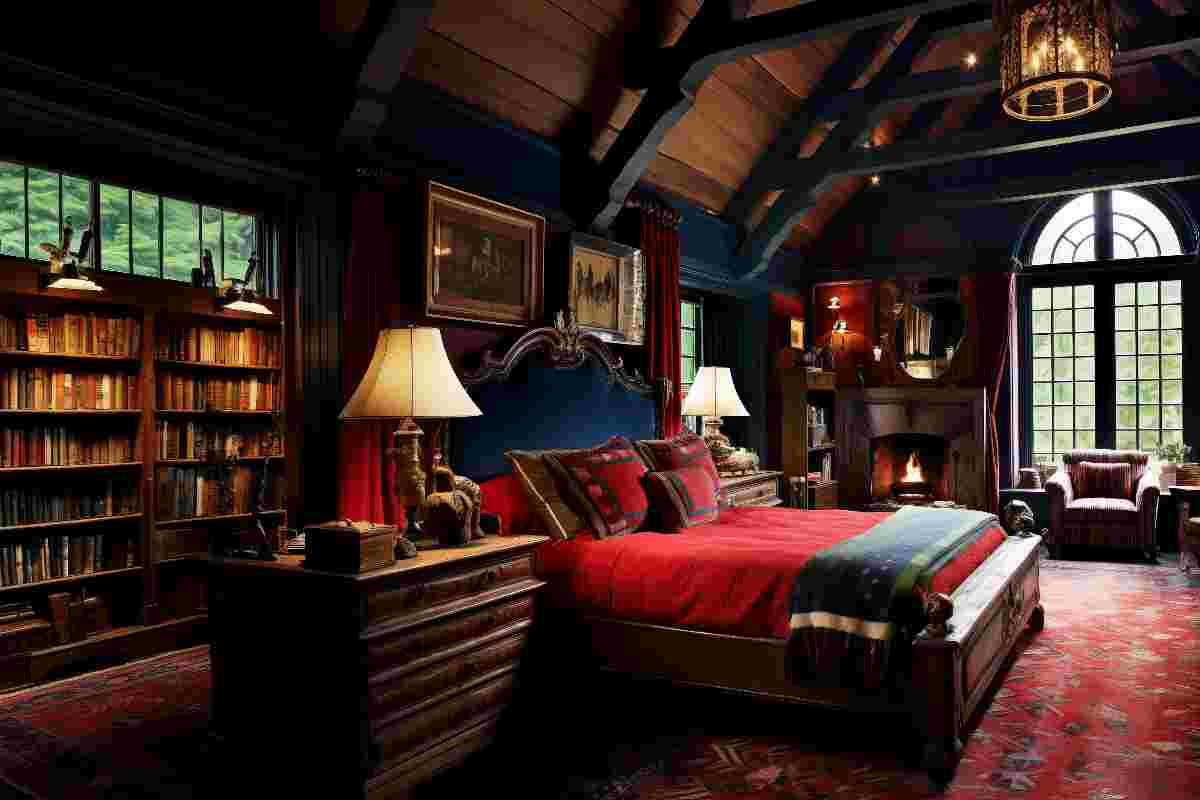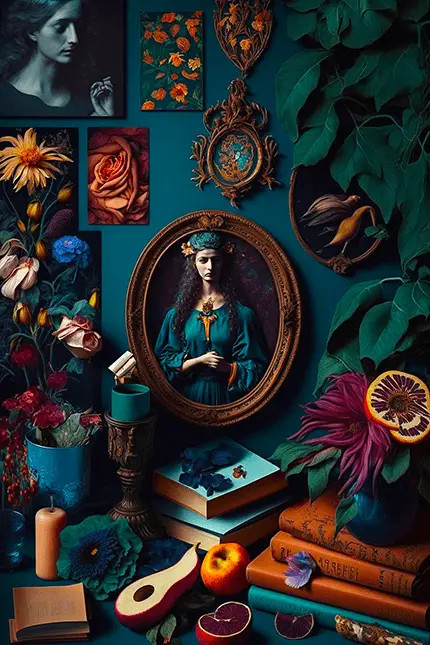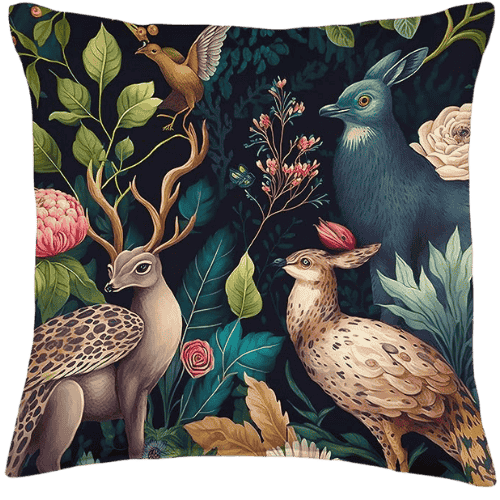Dark Academia: The Modern Renaissance
Dark Academia – an aesthetic, subculture, and design style – concerns itself with higher education and the pursuit of scholarship. Fixating on the mysterious aspects of academia, art, nature, and the humanities, it draws in curious rebels from all walks of life.
Melding 1940s Prep with murder, mystery, and maximalist Harry Potter style, Dark Academia evokes Gothic university vibes and the cozy feel of reading by a fire.
Home / Dark Academia
ARTICLES
What Is Dark Academia?
Dark Academia is the core culture dedicated to the aesthetic darkness of learning and ancient academic institutions. Both visually and psychologically, this modern, yet historically influenced aesthetic finds beauty in the shadier aspects and imagery of scholarly pursuits.


Green
Green, the color of nature, represents renewal, rebirth, and the cyclical nature of life. Medieval Gothic Christian art associated green with the Resurrection and the hope of eternal life.

BLUE
Blue, symbolizes spirituality and divine wisdom. It represents intellectual awakening, a gateway to higher knowledge, elusive truths, and mysteries that lie beneath the surface.

RED
Red, the color of power and passion represents strength, rebellion, and pleasure. The color of royalty, revolution, and rebellion, red embodies courage, symbolizes battlefield valor, vitality, control and protection from evil spirits.

GRAY
Gray, urban, industrialized, and emotionally complex, signifies maturity and wisdom. It conveys a sense of experience, composure and understated beauty. Timeless, permanent and stable. gray represents a solid fountation in changing times.

Dark Academia Meaning
What does Dark academia mean? As a result of Dark Academia’s mysterious core values, the definition of Dark Academia remains shrouded in shadows. Generally, however, Dark Academia means pursuing knowledge and creativity extremely, all consumingly, and at any cost.
As a style and subculture, this aesthetic amalgamates academic institutions, historical influences, periods, people, and events with preppy, modernized old-money visuals and witchy Cottagecore vibes.

Dark Academia Aesthetic

Related Aesthetics
- Light Academia
- Romantic Academia
- Old Money Aesthetic
- Gothic
- Grunge
- Royalcore
- Cottagecore
- Preppy

Historical Eras
Not from a single time, Dark Academia blends items from different historical periods, from Classical Greek and Roman times through today. Telling stories using allegory and symbolism through design and imagery, the style transcends eras, displaying a deeply layered tale of human history.
Drawing inspiration from a variety of sources, it adds unique elements and interpretations showcasing every academic’s scholarly wit and individual know how.
Modern, yet from the past, the style harnesses the nostalgic energy of bygone eras, or perhaps more importantly, eras that never existed outside the wishful reality of our minds.

Dark Academia Buildings & Architecture



With their vertical emphasis, Gothic churches and cathedrals symbolized a metaphorical ascent toward divine connection. The tallest of these buildings Ulmer Münster, in Germany measures 161.53 meters (530 feet) in height.
The Gothic Arch, a huge structural innovation, allowed architects to reach for the skies, building taller, exceedingly expansive open structures that increased light and human capacity.
Dark Academia Music
Many musical works considered Dark Academia-themed feature a haunting or eerie feel to them. This musical style incorporates elements of classical music, alternative rock, and a blend of gothic or horror-inspired sounds.
The classical piece “Dies Irae” by Mozart is often mentioned in discussions of Dark Academia due to its mysterious melody and ominous tone.

Dark Academia Activities
Privileged pastimes of the aristocracy, these haunting hobbies include brilliant books, mesmerizing music, and enchanting escapism. Dive into forbidden fun with classic games and playful pursuits.

Dark Academia Activities
Reading classic literature, studying wars and negotiation tactics, practicing calligraphy, visiting museums, learning languages, and participating in as many forms of art and craft as possible.
From the lute to the pianoforte, musical talents showed one had enough class and privilege to afford such pastimes. Studying dancing, fencing, and classical sports signified peal fitness of body and mind.
Other acceptable activities include but are not limited to golf, horse back riding, Polo, knitting, tennis, embroidery, painting, photography, pastry, sailing, ping pong, and lacrosse.


Dark Academia Symbolism

Dark Academia Pets

Dark Academia Interior Design
Defiantly dark and decadently distinguished, Dark Academia rooms light up with intriguing illuminations that cast shadows across layers of fine fabrics laid over heavy Gothic furniture and maximalist vintage decor.
Dark Academia's Impact
In a world that can often feel chaotic and uncertain, the subculture gives sanctuary to all fields of academics, providing a sense of community and belonging to younger generations.

Dark Academia's Criticisms
Though critics blame everyone for being “unfair” because doing so helps them sleep at night instead of working to change the world, they fall short in their complaints against Dark Academia.
Dark Academia, the yin to Light Academia’s yang, stretches as wide as academia itself or as narrow as our understanding of it.
Criticizing Westerners (a.k.a. native English speakers) for beginning their journey into Dark Academia in England sounds as absurd as criticizing the Japanese for exploring their own versions of “Dark Academia” in their language and through the lense of their culture.
Oh those racist Japanese. How dare they study the literature of their forefathers without also learning English and studying ours at the same time.
The same critics who decry the racism inherent in the English version of Dark Academia style, likely scream “cultural misapropriation” when a white person adopts anything deemed “not white enough for their skin color.”
In their criticism of Dark Academia, a critique that parrots itself across every article on the topic, the author of Bookish Brews writes:
“…it’s exceptionally white and Eurocentric.”
Sorry, Plato, Greek founder of the world’s first Dark Academia University – The Academy – circa 387 BC, the Americans think you’re too white. You’re cancelled.
Can someone tell the Arabs who invented MATH, or Fatima al-Fihri, the wealthy woman, who started the world’s second university, University of Al Quaraouiyine in Fez, Morocco that the American’s called to say life’s not fair?
They continue… “the majority of dark academia media does not foster an inclusive space for people of the global majority and you can see it in books or on screen.”
Netflix alone offers Dark Academia in every language AND COLOR. In fact, if that’s how you to see the world, you can get your Dark Academia in varied shades of Iranian, Turkish, or Tunisian brown.
Pro Tip for Old White Guys sick of being blamed for everything in America: if you get your media in any language but a white one, the villains will be Old Other Colored Guys.
In cultures of every “color”, anyone considered “different” or “other” gets treated poorly – often for no reason at all. Stop complaining. Start fixing.
Nevertheless, by pointing out the true pitfalls of the past – mainly in women’s access to education and domestic help when they wanted work outside of the home – Dark Academia as a culture seeks to inspire future generations to embrace learning as a way out and a way to realize the consequences of their actions before they reach an age that grants them wisdom.


CLASSIC, VINTAGE, PREPPY, GOTHIC, ROMANTIC, COTTAGECORE
Modern Dark Academia Aesthetic
Imagine yourself in a dim dungeon full of privileged young minds wearing silk ties and luxurious wool blazers. The sound of antique fountain pens on vellum permeates the air.
Medieval (5th – 15th century) and Renaissance (14th – 17th century) period art, architecture, and material culture influence the aesthetic, highlighting an atmosphere of romantic longing for times that never happened.
Dark Academia fields of scholarship include classical literature, history, alchemy, philosophy, the occult, ancient languages, classical texts, exotic cultures and more.

Get the answers to Dark Academia’s most frequently asked questions.
What Is Dark Academia?
Dark Academia is:
- An aesthetic and subculture characterized by a fascination with knowledge, learning, literature, art, and classical civilizations.
- A fashion style that includes a blend of academic, gothic, and vintage clothing, often featuring dark or muted colors, tweed, black turtlenecks, high-waisted pants or skirts, loafers, blazers, and accessories such as scarves, gloves, and berets.
Who Is Dark Academia For?
Dark Academia enthusiasts, known as dark academics:
- Romanticize ideas of attending elite universities or boarding schools. and enjoy activities such as reading, writing, studying, and discussing philosophy.
- Appreciate art, music, and films that have a melancholy or intellectual tone, or occult and supernatural themes.
Article References & Further Dark Academia Reading
- Bennett, C., Rascoe, F., & Givens, M. (2023-01-27). “What Is Dark Academia?” smartech.gatech.edu. Georgia Tech Library. Retrieved 2023-02-06.
- Edwards, Caroline (2020-04-24). “Dark Academia is the witchy literary aesthetic sweeping TikTok”. i-d.vice.com. Vice Media. Retrieved 2023-02-06.
- Ranasinghe, P. J. (2022).An exploration of the dissemination of knowledge through the “Dark Academia” aesthetic. University of Colombo Review, 3(2).
- Adriaansen, R. (2022). Dark Academia: Curating Affective History in a COVID-Era Internet Aesthetic. International Public History, 5(2), 105-114.
- Fleming, P., Rudolph, J., & Tan, S. (2021). ‘Never let a good crisis go to waste’. An interview with Professor Peter Fleming on dark academia, the pandemic and neoliberalism. Journal of Applied Learning and Teaching, 4(2), 110-120.
How To Dress Dark Academia

COLORS, PAINT HUES, HEX CODES
Dark Academia Color Palette
Let nightfall navy, bold burgundy, and gloriously gothic green wrap you in mystery and scholarly allure as you embark on a quest for knowledge, symbolism and creative inspiration.

HISTORY, HOBBIES, HUMANITIES
Dark Academia Aesthetic(s)
Get lost in darkness aesthetics, where Preppy, Cottagecore charm, Old Money aristocracy and classical romantic elegance, meet gothic motifs and creative chaotic collegiate spirit.
10 Proven Ways to Improve Your Health and Wellness in 2025 In today’s fast-paced
50 Boho Bedroom Ideas for a Cozy Bohemian Retreat Transform your bedroom into a
Mid-Century Modern Bedroom Ideas Mid-century modern bedrooms sweep you into a vibrant era that











